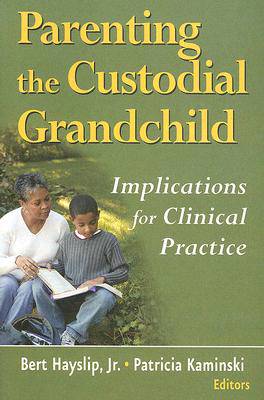
- Retrait gratuit dans votre magasin Club
- 7.000.000 titres dans notre catalogue
- Payer en toute sécurité
- Toujours un magasin près de chez vous
- Retrait gratuit dans votre magasin Club
- 7.000.0000 titres dans notre catalogue
- Payer en toute sécurité
- Toujours un magasin près de chez vous
Parenting the Custodial Grandchild
Implications for Clinical Practice
Bert, Jr. Hayslip, Patricia KaminskiDescription
Grandparents have long played important roles in the lives of their adult children and their grandchildren in our own as well as in many other cultures. Yet it has only been in the last 3 or 4 decades that grandparents have received the kind of academic scrutiny that other family members--especially mothers--have been receiving a century or more.
This groundbreaking collection has targeted the essence of what occurs in the context of grandparents' efforts at parenting their grandchildren as well as the nature of these interactions. Indeed, grandparent's views on the adequacy of their parenting skills and the nature of their relationships with their grandchildren are at the heart of many of the difficulties and satisfactions associated with the resumption of the parenting role in middle and later life, and are of central importance in the lives and well-being of both custodial grandparents and their grandchildren.
The volume, which will be of vital interest to family counselors, mental health practitioners, educators, school counselors, social workers, psychologists, and social service providers, approaches this issue from novel theoretical perspectives, presents new empirical data, and provides valuable suggestions for therapists who are treating grandparent-grandchild dyads. It is methodologically diverse, relying upon case studies, empirical findings, and national datasets. Additionally, it incorporates longitudinal work, which has been absent in research with grandparent caregivers to date. Most importantly, it defines new areas of understanding of custodial grandparents that are relevant to both researchers and practitioners, e.g., dealing with grief and loss, a focus on grandchildren, the interactional style of caregiving, parenting education, intergenerational ambivalence, and therefore, should provide fertile ground for work regarding these issues which are so central to the lives of custodial grandparents and their grandchildren.
- Highlighted coverage includes:
- Intergenerational relationships/intergenerational transmission of values and their implications for parenting among custodial grandparents
- the adjustments custodial grandchildren must make in the school system, viewed from the perspective of school personnel (an assistant principal and school counselor)
- the experiences/perceptions of adult children raised by their grandparents- impact on relationships with grandparents and the parenting of their own children
- the role of the adult parent in the context of grandparents raising grandchildren Each of these chapters will be written from an applied, practitioner perspective and stress the clinical implications of each issue.
Spécifications
Parties prenantes
- Auteur(s) :
- Editeur:
Contenu
- Nombre de pages :
- 314
- Langue:
- Anglais
Caractéristiques
- EAN:
- 9780826116857
- Date de parution :
- 24-03-08
- Format:
- Livre broché
- Format numérique:
- Trade paperback (VS)
- Dimensions :
- 172 mm x 214 mm
- Poids :
- 444 g

Les avis
Nous publions uniquement les avis qui respectent les conditions requises. Consultez nos conditions pour les avis.






